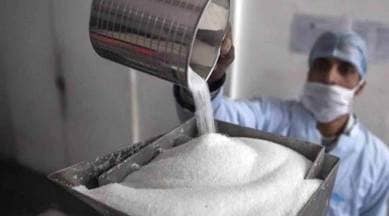Harikishan Sharma, Senior Assistant Editor at The Indian Express' National Bureau, specializes in reporting on governance, policy, and data. He covers the Prime Minister’s Office and pivotal central ministries, such as the Ministry of Agriculture & Farmers’ Welfare, Ministry of Cooperation, Ministry of Consumer Affairs, Food and Public Distribution, Ministry of Rural Development, and Ministry of Jal Shakti. His work primarily revolves around reporting and policy analysis. In addition to this, he authors a weekly column titled "STATE-ISTICALLY SPEAKING," which is prominently featured on The Indian Express website. In this column, he immerses readers in narratives deeply rooted in socio-economic, political, and electoral data, providing insightful perspectives on these critical aspects of governance and society. ... Read More
Sugar subsidies ‘inconsistent’, withdraw in 120 days: WTO panel; India to appeal
Ruling in favour of Brazil, Australia and Guatemala in their trade dispute with India over sugar subsidies, the WTO panel said, “We recommend that India bring its WTO-inconsistent measures into conformity with its obligations under the Agreement on Agriculture and the SCM Agreement.”

A World Trade Organization (WTO) panel has asked India to withdraw its subsidies under the Production Assistance, the Buffer Stock, and the Marketing and Transportation Schemes.
Ruling in favour of Brazil, Australia and Guatemala in their trade dispute with India over sugar subsidies, the WTO panel said, “We recommend that India bring its WTO-inconsistent measures into conformity with its obligations under the Agreement on Agriculture and the SCM Agreement.”
monthly limit of free stories.
with an Express account.
“We recommend that India withdraw its prohibited subsidies under the Production Assistance, the Buffer Stock, and the Marketing and Transportation Schemes within 120 days from the adoption of our Report,” the panel said.
It asked India to withdraw the subsidies without delay within a time-period specified by the Panel. The panel’s 115-page report, ‘India — Measures Concerning Sugar and Sugarcane’, was circulated to members on Tuesday.
Responding to the report, the Commerce and Industry Ministry said Tuesday that the findings of the Panel are “completely unacceptable” to India. “There would be NO impact of WTO Panel’s findings on Sugar on any of India’s existing and ongoing policy measures in sugar sector,” it said, adding, “India has initiated all measures necessary to protect its interest and file an appeal at the WTO against the report, to protect the interests of its farmers.”
Referring to complaints by three countries — Australia, Brazil and Guatemala — against India over its policy measures in the sugar sector, at the WTO in 2019, the Ministry said, “They had wrongly claimed that domestic support provided by India to sugarcane producers is in excess of the limit allowed by the WTO and that India provides prohibited export subsidies to sugar mills.”
“The Panel issued its report on 14 December 2021 in which it has made certain erroneous findings about our schemes to support sugarcane producers and exports,” it added.
“The findings of the Panel are completely unacceptable to India. The Panel’s findings are unreasoned and not supported by the WTO rules. The Panel has also evaded key issues which it was obliged to determine. Similarly, the Panel’s findings on alleged export subsidies undermines logic and rationale,” the Ministry said.
“India believes that its measures are consistent with its obligations under the WTO agreements,” it added.
In 2019, Brazil, Australia and Guatemala had approached the WTO complaining against India for providing alleged support in favour of producers of sugarcane and sugar (domestic support measures), as well as all export subsidies that India allegedly provides for sugar and sugarcane (export subsidy measures).
On July 11, 2019, Australia requested the establishment of a Panel and on August 15, 2019, the Dispute Settlement Body (DSB) established the panel.
‘FDI policy can be strengthened’
New Delhi: WTO Director General Ngozi Okonjo-Iweala said Tuesday India’s foreign direct investment (FDI) policy “remains ambiguous and can be strengthened,” noting that companies face lengthy approval processes to invest here with “targeted restrictions that remain in place in strategic sectors.”
She said that continuing on the reform path would enhance the competitiveness of Indian businesses both in India and abroad. —ENS